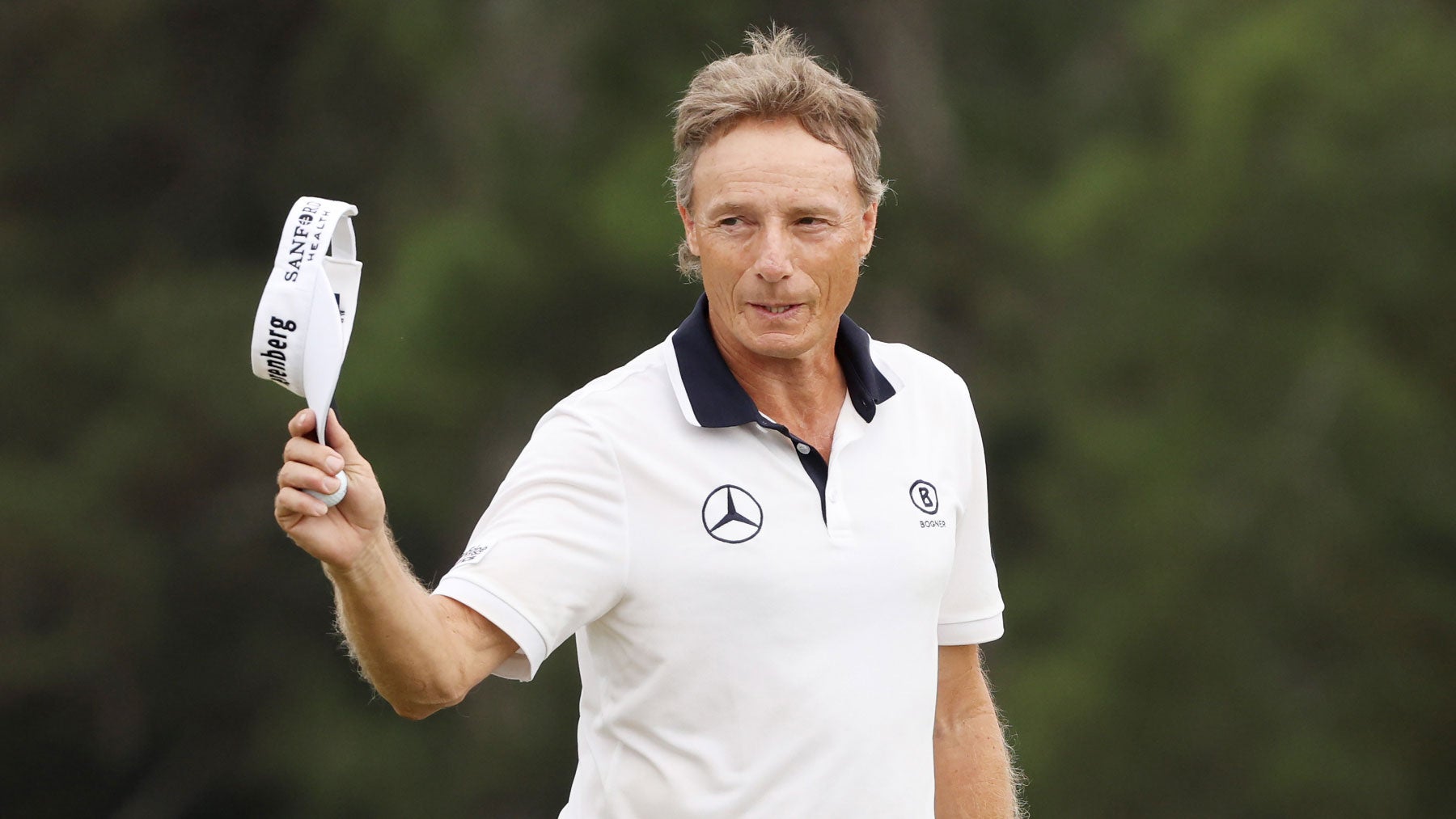In 2002, Augusta National announced a policy, effective in 2004, that would prohibit past Masters winners from participating in the tournament past the age of 65. The rule was not well received by the players, because it seemed to target less heralded champions like Doug Ford and Gay Brewer while not applying to, say, Arnold Palmer or Jack Nicklaus, who the club would never have the gall to disinvite, no matter how many years those legends might want to keep coming back. Feeling the heat, the club walked back the mandate, but the message already had been delivered: Augusta National would like to avoid past winners on the tee sheet who are old enough to enjoy a Denny’s discount.
Bernhard Langer, now 66, knows this well. Several years ago, the two-time green coat winner asked the club chairman — Langer didn’t say which chairman — for clarity on the policy.
“Is there an age limit or, you know, when do you tell people to stop playing?” Langer said, recalling the story at last year’s Masters.
“Listen, Bernhard,” the chairman said, “you will know yourself when it’s time to stop.’”
When you’ll know, you’ll know.
Langer said he had hoped the chairman was right, because Langer didn’t want to “make a fool” of himself in competition. “If you see me shooting 80s and 82s and stuff around here,” he said, “then it’s definitely time to call it a day.”
In 40 Masters starts since his 1983 debut, Langer has just twice failed to break 80. The first occurrence came in the second round in 2009, and the second in the second round in 2012. In his 132 other Masters rounds, Langer has been a beacon of consistency and longevity. Just four years ago, at the out-of-season fall Masters, Langer opened with a 68 and finished in the top 30. The only thing leaner than his scorecards (68-73-73-71) was his frame. He looked like he could compete at Augusta forever. Hell, even last year, Langer — then old enough to collect Medicare — looked fitter than half the field. He missed the cut, finishing at seven over, but far from made a fool of himself, outplaying the likes of Min Woo Lee, Sergio Garcia and soon-to-be Champion Golfer of the Year, Brian Harman.
How many more Masters, reasonable minds might have wondered, did Langer have in him? A couple? Three? Could he possibly make a Masters start at 70?
The sobering answer arrived Wednesday, when Langer revealed in a Golf Channel interview that the 2024 Masters will be his last. All Augusta runs must come to an end, of course, but this one hits differently, because I, for one — and maybe you feel this way, too? — am not quite ready to see Langer go. He‘s too youthful, too active, too…good. Last year, when you would have been forgiven for thinking Langer’s remarkable senior career might finally begin to wane, he won two more titles — giving him 46 in all to eclipse Hale Irwin’s career PGA Tour Champions tally — including a triumph on the fiercest setup of the year, at the U.S. Senior Open, at SentryWorld in Wisconsin. “My caddie just told me the average age of the U.S. Senior Open winner is 52,” Langer said afterward, “and here I am at 66.”
Just as he was at 26…and 46…and, well, it wasn’t all that hard to imagine Langer still doing magical things at 76 — in Akron, or Endicott or, yes, even Augusta. Gosh, has he been good there: nine top 10s; 27 made cuts; a 72.81 scoring average, which includes 18 rounds that he played in his 60s. Those are the starts that most boggle the mind, in which Langer has hung tough in the face of extreme competitive disadvantages. Last April, he finished only two strokes behind Rory McIlroy while finishing 60 yards behind McIlroy in driving distance average (265 yards vs. 325 yards). “The hardest part here is hitting very long clubs into the greens and not reaching the par-5s in two,” Langer said that week. “That makes the golf course play five, six, seven shots harder than it did when I was a young man.”
In the Golf Channel interview that aired this week, Langer added: “I’m going to be hitting 3-irons and 2-hybrids when the guys are hitting 9-irons into the green, and that’s tough to compete against. But it’s a challenge, and I usually don’t shy away from challenges.”
For years, Langer proved that. In 2014 — at 56, or a full decade older than Jack Nicklaus was during his epic 1986 win — Langer was just two off the lead with 12 holes left in his final round. Two years later, he was sniffing contention again through 54 holes before a Sunday 79 derailed him. Not that you could tell from Langer’s even demeanor.
That’s another thing about Langer: He’s an antidote for these manic, emotional, uncertain times in professional golf. Never too hot nor too cold. Steady as his hybrids. Unassuming. Even in his prime, Langer never would have been on the short list for a PIP payout, and that’d have been just fine with him. Chest-beating and flash have never been his things. Practice hard, play hard, pray hard. Enjoy the fruits of those labors with family and friends. Simple formula. It worked. Still does.
At Augusta National, especially. Yes, the course rewards derring-do, but fairways and greens, Langer will tell you, are an effective strategy, too. How else to explain how a Masters entrant can beat opponents who are both 40 years younger than him and 40 yards longer? Really, they’ve been a perfect match, Langer and Augusta: a golfer who never seemed to age and a golf course that has done the same. But, of course, Langer has aged. And that’s why this Masters adieu cuts deeper than most. It’s a reminder not only of a great champion’s mortality but perhaps also of our own.
